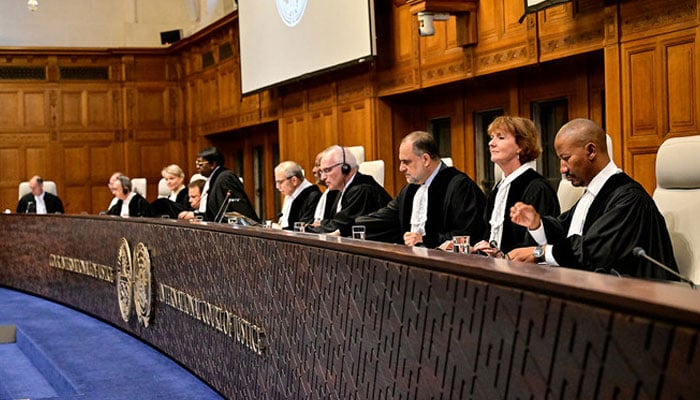ICJ speaks up
International Court of Justice (ICJ) has said that Israel’s occupation of Palestinian territories and its settlements there is all illegal
The biggest elephant in the human rights and international law room was finally addressed on an official level on July 19. The International Court of Justice (ICJ) or the World Court has said that Israel’s occupation of Palestinian territories and its settlements there is all illegal and should be withdrawn as soon as possible. This has been the case since the first Palestinian territories were officially occupied in 1967 and has been the case since the first illegal Zionist settlements were built on these territories decades ago, not to mention the illegal expulsion of Palestinians from the homeland two decades prior in 1947. That the ICJ has taken so long to settle an open-and-shut case of human rights and international law violations speaks volumes about how long international courts and bodies and individual countries have failed to uphold their duties to maintain human rights and discipline rogue states that break international law. More importantly and tellingly, it goes to show how much of the global political, legal and economic architecture has often served as a proxy for Western interests.
But things are changing and at pace. Though this ruling is not binding, it is indicative of the shift that has taken place against Israel in international institutions and also in terms of global opinion. It follows the formal recognition of a Palestinian state by Ireland, Spain and Norway, all countries firmly in the pro-West/US-led orbit. It also comes on the heels of a previous ruling calling on Israel to halt its offensive in Rafah. Such a slew of symbolic international victories for the Palestinians is unprecedented, which has often only been able to count on other developing and former USSR countries for support, and raises the question: why now? For one, the West does not command the power and influence it once did. Its economies and militaries, led by the US, are smaller as a share of the world than they were in the mid-to-late 20th century. Then there is the fact that the horrors of occupation in genocide in Gaza and throughout the Palestinian territories are now more visible to people across the world thanks to a more decentralized and internet-based media ecosystem. The mangled bodies of women and children, the wanton cruelty and the gross injustice of it all can no longer be kept from view. In the latest act of depravity, a Palestinian man with Down’s syndrome was attacked by an army dog in Gaza and left on his own by IDF soldiers; he was found dead a week later.
So what does this all mean for the Palestinians? In the immediate term: not much, sadly. The bombs on Gaza will likely continue to fall and the US will likely remain firm in its backing of the Zionist state. The two candidates in its upcoming presidential elections are actually working overtime to out-Zionist each other. That being said, given the global power shifts taking place, the day will come when US support will no longer be the difference maker it is right now. And, while the US may be more than willing to jeopardize global norms and stability to maintain the Zionist state, others will be more likely to take a pragmatic view. Peace and justice now look closer at hand than many would have thought possible just months ago.
-
 Eric Dane's Girlfriend Janell Shirtcliff Pays Him Emotional Tribute After ALS Death
Eric Dane's Girlfriend Janell Shirtcliff Pays Him Emotional Tribute After ALS Death -
 King Charles Faces ‘stuff Of The Nightmares’ Over Jarring Issue
King Charles Faces ‘stuff Of The Nightmares’ Over Jarring Issue -
 Sarah Ferguson Has ‘no Remorse’ Over Jeffrey Epstein Friendship
Sarah Ferguson Has ‘no Remorse’ Over Jeffrey Epstein Friendship -
 A$AP Rocky Throws Rihanna Surprise Birthday Dinner On Turning 38
A$AP Rocky Throws Rihanna Surprise Birthday Dinner On Turning 38 -
 Andrew Jokes In Hold As BAFTA Welcomes Prince William
Andrew Jokes In Hold As BAFTA Welcomes Prince William -
 Sam Levinson Donates $27K To Eric Dane Family Fund After Actor’s Death
Sam Levinson Donates $27K To Eric Dane Family Fund After Actor’s Death -
 Savannah Guthrie Mother Case: Police Block Activist Mom Group Efforts To Search For Missing Nancy Over Permission Row
Savannah Guthrie Mother Case: Police Block Activist Mom Group Efforts To Search For Missing Nancy Over Permission Row -
 Dove Cameron Calls '56 Days' Casting 'Hollywood Fever Dream'
Dove Cameron Calls '56 Days' Casting 'Hollywood Fever Dream' -
 Prince William, Kate Middleton ‘carrying Weight’ Of Reputation In Epstein Scandal
Prince William, Kate Middleton ‘carrying Weight’ Of Reputation In Epstein Scandal -
 Timothée Chalamet Compares 'Dune: Part Three' With Iconic Films 'Interstellar', 'The Dark Knight' & 'Apocalypse Now'
Timothée Chalamet Compares 'Dune: Part Three' With Iconic Films 'Interstellar', 'The Dark Knight' & 'Apocalypse Now' -
 Little Mix Star Leigh-Anne Pinnock Talks About Protecting Her Children From Social Media
Little Mix Star Leigh-Anne Pinnock Talks About Protecting Her Children From Social Media -
 Ghislaine Maxwell Is ‘fall Guy’ For Jeffrey Epstein, Claims Brother
Ghislaine Maxwell Is ‘fall Guy’ For Jeffrey Epstein, Claims Brother -
 Timothee Chalamet Rejects Fame Linked To Kardashian Reality TV World While Dating Kylie Jenner
Timothee Chalamet Rejects Fame Linked To Kardashian Reality TV World While Dating Kylie Jenner -
 Sarah Chalke Recalls Backlash To 'Roseanne' Casting
Sarah Chalke Recalls Backlash To 'Roseanne' Casting -
 Pamela Anderson, David Hasselhoff's Return To Reimagined Version Of 'Baywatch' Confirmed By Star
Pamela Anderson, David Hasselhoff's Return To Reimagined Version Of 'Baywatch' Confirmed By Star -
 Willie Colón, Salsa Legend, Dies At 75
Willie Colón, Salsa Legend, Dies At 75




